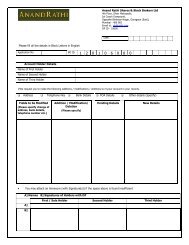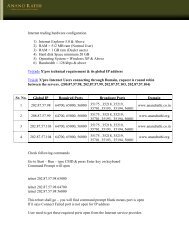ARG COMPLIANCE MANUAL - Rathi Online
ARG COMPLIANCE MANUAL - Rathi Online
ARG COMPLIANCE MANUAL - Rathi Online
You also want an ePaper? Increase the reach of your titles
YUMPU automatically turns print PDFs into web optimized ePapers that Google loves.
C. Guiding Principles3.1.1. These Guidelines have taken into account the requirements of the Prevention of the MoneyLaundering Act, 2002 as applicable to the intermediaries registered under Section 12 of the SEBIAct. The detailed guidelines in Part II have outlined relevant measures and procedures to guide theBranches / Business Associates in preventing money laundering and terrorist financing. Some ofthese suggested measures and procedures may not be applicable in every circumstance. EachBranch / Business Associates should consider carefully the specific nature of its business,organizational structure, type of customer and transaction, etc. to satisfy itself that the measurestaken by them are adequate and appropriate to follow the spirit of the suggested measures in Part IIand the requirements as laid down in the Prevention of Money Laundering Act, 2002.3.2 Obligation to establish policies and procedures3.2.1. International initiatives taken to combat drug trafficking, terrorism and other organized and seriouscrimes have concluded that financial institutions including securities market intermediaries mustestablish procedures of internal control aimed at preventing and impeding money laundering andterrorist financing. The said obligation on intermediaries has also been obligated under thePrevention of Money Laundering Act, 2002. In order to fulfill these requirements, there is also aneed for registered intermediaries to have a system in place for identifying, monitoring andreporting suspected money laundering or terrorist financing transactions to the law enforcementauthorities.3.2.2. In light of the above, senior management of a Branch / Business Associates should be fullycommitted to establishing appropriate policies and procedures for the prevention of moneylaundering and terrorist financing and ensuring their effectiveness and compliance with all relevantlegal and regulatory requirements. The Registered Intermediaries should:(a) issue a statement of policies and procedures, on a group basis where applicable, for dealingwith money laundering and terrorist financing reflecting the current statutory and regulatoryrequirements;(b)(c)(d)(e)(f)ensure that the content of these Guidelines are understood by all staff members;Regularly review the policies and procedures on prevention of money laundering andterrorist financing to ensure their effectiveness. Further in order to ensure effectiveness ofpolicies and procedures, the person doing such a review should be different from the onewho has framed such policies and procedures;adopt customer acceptance policies and procedures which are sensitive to the risk of moneylaundering and terrorist financing;undertake customer due diligence (“CDD”) measures to an extent that is sensitive to the riskof money laundering and terrorist financing depending on the type of customer, businessrelationship or transaction; anddevelop staff members‟ awareness and vigilance to guard against money laundering andterrorist financing.3.2.3. Policies and procedures to combat Money Laundering should cover:(a) Communication of group policies relating to prevention of money laundering and terroristfinancing to all management and relevant staff that handle account information, securitiestransactions, money and customer records etc. whether in branches, departments orsubsidiaries;(b) Customer acceptance policy and customer due diligence measures, including requirementsfor proper identification;109





